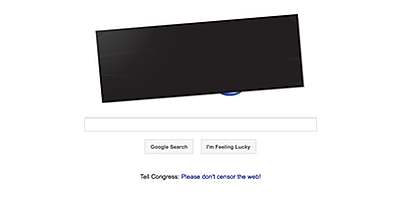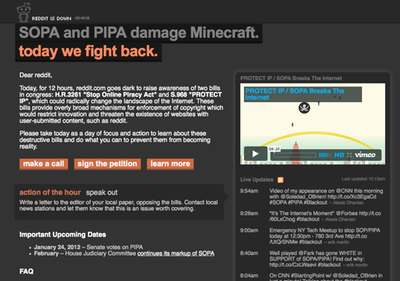- By -Staff
- Opinions
 Print
Print  You may have noticed that some of your favorite Web sites were 'on strike' Wednesday. Sites like wikipedia.org, mozilla.org, and many others blacked out, instead telling site visitors about The Stop Online Piracy Act (SOPA) and its Senate companion, the Protect IP Act (PIPA) and asking them to write their Congressmen and Senators to oppose the acts. Other sites elected to stay up, but even they told people about the threats the proposed laws pose and urged visitors to contact their legislators. Google was one of these. There was a big black rectangle over their logo, and when you moused over it a message said, "Tell Congress: Please don't censor the web!"
You may have noticed that some of your favorite Web sites were 'on strike' Wednesday. Sites like wikipedia.org, mozilla.org, and many others blacked out, instead telling site visitors about The Stop Online Piracy Act (SOPA) and its Senate companion, the Protect IP Act (PIPA) and asking them to write their Congressmen and Senators to oppose the acts. Other sites elected to stay up, but even they told people about the threats the proposed laws pose and urged visitors to contact their legislators. Google was one of these. There was a big black rectangle over their logo, and when you moused over it a message said, "Tell Congress: Please don't censor the web!"Many people are confused by the opposition to these laws. Isn't piracy bad? Shouldn't we want to stop it? The answer is pretty obvious. Of course we should. And in my opinion Congress should be applauded for trying to do something about it. They certainly take criticism for not catching the laws up to burgeoning technology.
The problem isn't that they are doing it. The problem is how they are doing it.
 Google on Wednesday
Google on WednesdayCritics of SOPA and PIPA rightly say that the acts would stifle the free exchange of ideas, that they don't actually solve the problem, and that Internet security would actually be weakened if the anti-piracy acts were to be passed as written. They say that the acts, lobbied for and supported by huge content providers that make motion pictures, music, books, and other mainstream content, would certainly benefit those companies, but inadvertently destroy smaller Web sites, sites like Facebook and Reddit that can't (and largely don't seek to) control what their members post to each other.
Perhaps the worst consequence is that the government would gain control of Web sites at the IP (Internet protocol) level, blocking sites that are suspected of piracy. For small sites that would be tantamount to closing the sites forever, since so many sites do not have the resources to defend themselves even if they are innocent.
Does that sound familiar? How many news stories have you read about mainland China blocking Web sites? How did you feel about it when you read those stories or saw them on the news?
 Wikipedia has been vocal in its opposition to SOPA and PIPA. The English version of the site was down Wednesday.
Wikipedia has been vocal in its opposition to SOPA and PIPA. The English version of the site was down Wednesday.While the big content Hollywood and other guns argue that piracy threatens revenue and jobs at their companies, these bills seriously threaten revenue and jobs at countless small companies.
I used to be an independent software developer. I followed the dream of writing a 'killer app' and striking it rich. I actually know some people who did just that, but alas! I was not one of them. Instead, I worked very long hours, had to hustle to market and sell my products (two of which won awards), and never made enough money to make it worthwhile, which was one of the reasons I shifted to online publishing. As soon as I released a new version pirated versions would show up on the Internet.
These pirates were no Robin Hoods. They stole from the poor to give to themselves.
So nobody is more against content piracy than I am.
However, piracy will always exist because sleazy, greedy people who steal money off the backs of hard working people will always exist. There are good ways to solve problems like this, and bad ways. Bad ways are blanket solutions that are overwhelmingly applied and don't actually solve the problem. It's the same as throwing money at a problem and hoping it will go away.
Do we want a solution that allows congressmen and senators to feel good and be able to say they did something to stop online piracy, or do we want something that actually stops online piracy?
Here in Lansing we recently had a situation in our fire district that bears some similarities. The Fire Commissioners, responding to perceived problems including a swamped volunteer fire chief, slowdowns in training that were impacting the department's ability to respond to emergencies, and other issues prompted them to announce that they would be hiring a paid fire chief. Just about every member of the department was outraged. When the shouting quieted enough to hear people talk, it turned out that they had constructive ideas that would actually solve the problems, and well reasoned arguments to show why a paid chief wouldn't actually solve them.
The Fire Commissioners, to their everlasting credit, listened to their constituents, decided to meet with them, and worked together to come up with actually effective solutions. The big 'throwing a blanket solution that isn't a real solution' solution was put aside in favor of something that would make the department better.
 Reddit.com says its very existance is threatened by SOPA and PIPA.
Reddit.com says its very existance is threatened by SOPA and PIPA.Then there is New York's 2% property tax levy cap. When you get done, most municipalities can charge 5% more under the 2% cap. And that's just the levy. Because of economic problems, our local school tax rate could go up 8% this year (not saying it will, just that it could -- stay tuned!). That's a law that allows Albany legislators to trumpet that they are advocates of the taxpayer, that they are making life better. When they are most decidedly not.
As someone who has been in online publishing for about 16 years and content creation for most of my working life, I am against SOPA and PIPA. In my opinion they will make the Internet worse, make America more like Communist China in bad ways, threaten the free, constructive exchange of ideas we currently enjoy, and pander to big money companies at the expense of the little American Dream companies. They throw the baby away with the bathwater.
So, unlike many opponents, I am not against our government doing something about piracy. It is a huge problem that threatens our economy and way of life. If Congress shouldn't do something about it, who should? But I am against these particular bills.
At the moment the worst part of the legislation -- the part that would allow the Justice Department to force ISPs to block sites -- may be coming off the table. And President Obama has reportedly asked for changes to the bills. But the laws still have great potential to threaten social sites, small sites, sites that compete with big content providers. And diluting the bills politically is not the same as building it constructively and realistically.
If you thought there were a lot of smart people in our fire district who could lend their diverse talents to the actual solution of real problems, how many such people do you think are involved with the Internet that Congress could tap to find real solutions to piracy without hamstringing innocent people and trampling on their rights?
That's why these bills should not be passed as written. Sure, they would stop some piracy, but they would also threaten basic freedoms of millions of law abiding Americans for whom the Internet has become an integrated piece of daily life.
v8i3



